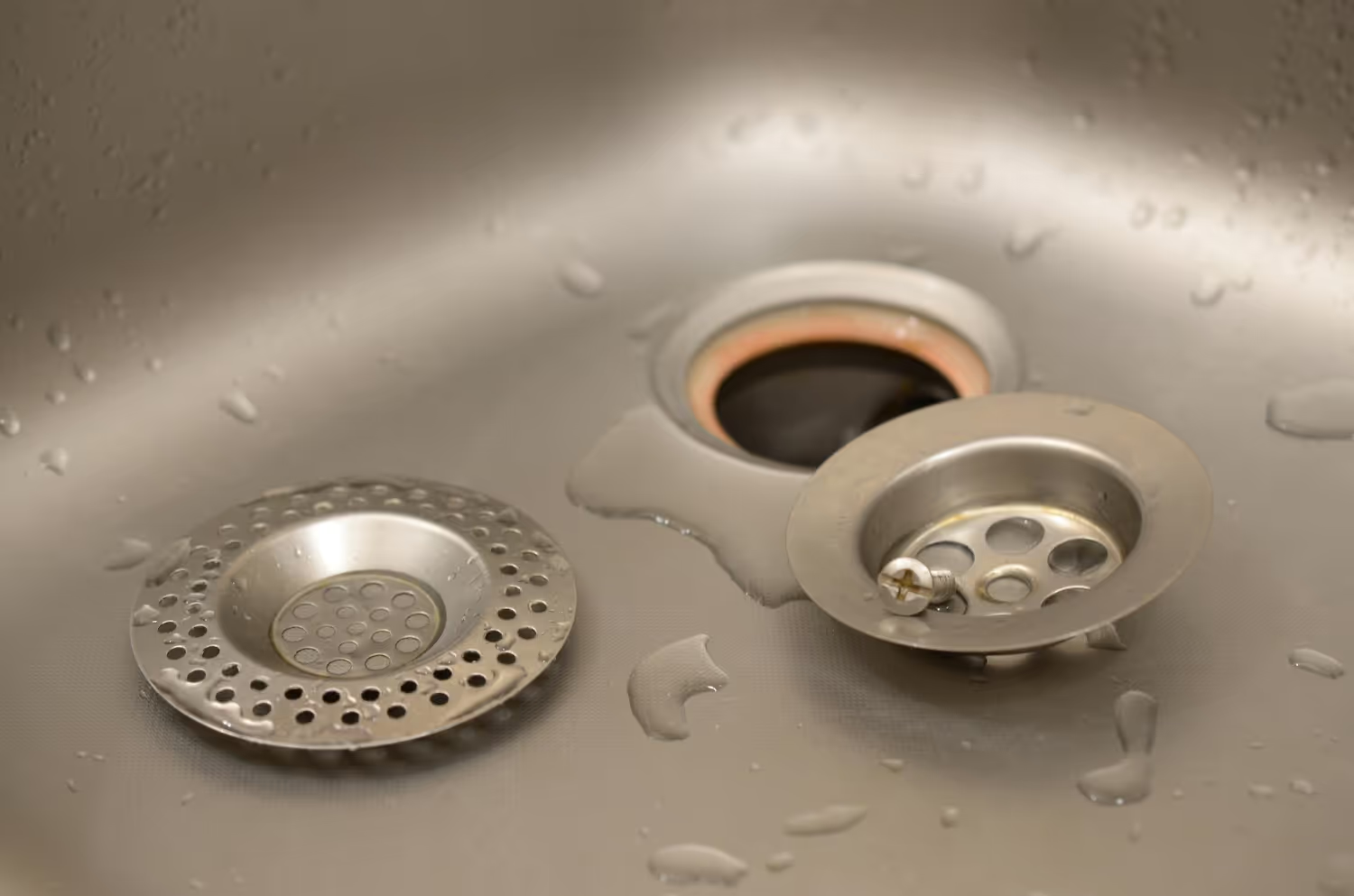


FREE Water Heater
With every whole house repipe purchase. Free brand-new water heater or credit towards a tankless water heater.
.svg)
.svg)
.svg)
.svg)



With every whole house repipe purchase. Free brand-new water heater or credit towards a tankless water heater.
.svg)
.svg)
.svg)
.svg)

A slow or smelly sink drain can turn daily tasks into unpleasant experiences. Hair, grease, soap scum, and food particles build up over time, creating blockages that trap water and cause bad odors. Most clear sink drain can be done at home using simple tools and natural ingredients like baking soda and vinegar.
We'll walk you through understanding what causes these issues in the first place. Kitchen drains typically clog from grease and food waste, while bathroom sinks usually get blocked by hair and soap buildup.
Here’s what you’ll find below:
The good news is that we can tackle most drain problems without harsh chemicals or expensive plumber visits. We'll show you proven methods to clear blockages, eliminate smells, and keep your drains running smoothly for the long term.
Sink drains get blocked when everyday materials build up inside the pipes over time. Kitchen and bathroom sinks face different types of clogs, but all can lead to slow drainage and bad smells.
Kitchen sinks get clogged mainly from grease and food particles. When we wash dishes, cooking oil and fat go down the drain. These materials cool down and stick to pipe walls.
Over time, grease traps other debris like food scraps and creates thick blockages. Even small amounts of oil can cause problems when they build up.
Bathroom sinks deal with different materials. Hair is the biggest culprit, especially long hair that wraps around drain parts. We also see soap buildup from bar soap and shampoo.
Soap scum mixes with hair and dead skin cells. This creates a sticky mess that catches more debris. The pop-up drain stopper often collects the most buildup because hair gets tangled around it.
Hard water makes soap buildup worse by leaving mineral deposits. These deposits make surfaces rougher, so more soap and hair stick to them.
Minor clogs can turn into major plumbing repair problems if we ignore them. Slow drains put extra pressure on pipes and joints.
Standing water from blocked drains can damage sink fixtures and countertops. Water that sits too long also creates breeding grounds for bacteria and mold.
Severe blockages can cause pipes to crack from pressure buildup. We might need to replace damaged pipes or repair leaking joints. These repairs cost much more than simple drain cleaning.
Chemical drain cleaners can make problems worse. Strong chemicals eat away at pipe materials over time. This damage leads to leaks and costly pipe replacement.
Professional plumbing repair becomes necessary when clogs move deep into the main drain lines or when multiple fixtures back up at once.
Water draining slowly is the first warning sign. Normal drainage should empty a full sink in under two minutes. Anything slower means buildup is starting.
Bad smells coming from the drain indicate trapped food or organic matter. These odors get worse over time as bacteria grow in the blockage.
Gurgling sounds mean air is trapped in the pipes. This happens when water has to squeeze past partial blockages.
Water backing up into the sink is a serious sign. This means the clog is nearly complete and needs immediate attention.
Multiple fixtures affected at once signals a problem in the main drain line. If both kitchen and bathroom sinks drain slowly, the blockage is deeper in the system and requires professional help.
You can clear most clogged drains using simple items from your kitchen pantry or basic plumbing tools. Natural cleaning methods work well for minor blockages, while mechanical tools handle tougher clogs.
Hot water often clears minor blockages without any chemicals. We recommend starting with this simple method first.
Step-by-step hot water flush:
Salt and hot water work together to break down grease buildup. Mix half a cup of salt with boiling water and pour it down the drain.
For stronger natural cleaning, try dish soap and hot water. Squirt liquid dish soap directly into the drain. Let it sit for 20 minutes, then flush with hot water.
These methods work best for slow draining sinks caused by soap scum or light grease buildup. Repeat the process 2-3 times if needed.
This popular DIY method creates a fizzing reaction that helps break down organic matter in your pipes.
Materials needed:
Pour the baking soda down the drain first. Follow immediately with the vinegar. The mixture will foam and bubble.
Cover the drain with a cloth or plug right away. This keeps the reaction inside the pipes where it works best.
Wait 30-60 minutes for the mixture to work. The longer you wait, the better it works on tough buildup.
Flush with hot water to wash away loosened debris. Use the hottest water your pipes can handle safely.
This method works well for cleaning sinks and removing odors. We suggest using it monthly to prevent future clogs.
Some clogs need mechanical force to break free. Use these tools when natural methods fail to clear the blockage.
Using a plunger:
Using a drain snake:
Try the plunger first since it's easier to use. The drain snake works better for hair clogs and solid objects stuck in pipes.
If both tools fail to clear the clog, the problem might be deeper in your plumbing system.
Several safe household items can break down clogs naturally, while specialized products target hair and organic matter buildup. Chemical solutions require careful handling to avoid damage to pipes and personal injury.
Baking soda and vinegar work together to dissolve grease and soap scum. We recommend pouring one cup of baking soda down the drain, followed by one cup of white vinegar.
The mixture will foam and bubble. Cover the drain with a plug or cloth for 15 minutes. This reaction helps break apart organic buildup.
Hot water dissolves grease clogs effectively. Boil a large pot of water and pour it slowly down the drain in two to three stages. Wait a few seconds between pours.
Dish soap cuts through grease when mixed with hot water. Add several tablespoons of liquid dish soap to boiling water. This combination works well for kitchen sink clogs.
Salt and baking soda create an abrasive mixture. Mix half a cup of each and pour down the drain. Wait 30 minutes, then flush with hot water.
Enzyme-based cleaners break down hair and organic matter naturally. These products use bacteria to eat away at clogs. They work slowly but safely on all pipe types.
We suggest leaving enzyme cleaners in drains overnight for best results. They won't damage pipes like harsh chemicals can.
Hair dissolver products contain specific ingredients that target hair clogs. Look for products with sodium hydroxide or potassium hydroxide. These work faster than enzyme cleaners.
Oxygen bleach powder dissolves organic matter without harsh fumes. Mix it with warm water according to package directions. It's safer than chlorine bleach for regular use.
Bio-enzymatic drain cleaners prevent future clogs by maintaining healthy bacteria in pipes. Use them monthly as part of regular maintenance.
Never mix different chemicals together. Combining products can create dangerous gases or reactions. Use one product at a time and read all labels carefully.
Wear protective equipment when handling chemical solutions. Use rubber gloves and eye protection. Work in well-ventilated areas to avoid breathing fumes.
Check pipe compatibility before using strong chemicals. Old or PVC pipes can be damaged by certain products. Metal pipes handle harsh chemicals better than plastic ones.
Follow contact time instructions exactly. Leaving chemicals too long can damage pipes. Not leaving them long enough makes them less effective.
Keep pets and children away from treated drains. Store all products in original containers with labels intact.
According to Forbes Home, professional drain snaking typically costs about $125–$360, while difficult or main-line clogs can reach $500–$800+ depending on severity and access.
Some sink problems need more than basic DIY fixes. Professional plumbers have special tools to clear deep blockages and can prevent clogs from coming back through proper cleaning methods.
We know that deep blockages often form far inside the plumbing system. These clogs can't be reached with a plunger or basic snake.
Plumbers use professional drain snakes that extend up to 100 feet into pipes. These tools have cutting heads that break through tough blockages.
Video inspection cameras help plumbers see exactly where the clog sits. They can spot problems like:
High-pressure water jetting blasts away stubborn clogs. This method uses water at 3,000 to 4,000 PSI to clear pipes completely.
We should call a plumber when water backs up into multiple drains. This means the main line has a blockage that needs professional tools to fix.
A plumbing repair expert can diagnose problems we might miss. They know the difference between a simple clog and a serious pipe issue.
Professional equipment works better than store-bought tools. Plumbers have:
Tool Type
Professional Version
Home Version
Drain Snake
100+ feet, motorized
25 feet, manual
Water Pressure
4,000 PSI jetting
Garden hose pressure
Inspection
Video cameras
Flashlight only
Licensed plumbers provide warranties on their work. If the clog comes back within the warranty period, they fix it for free.
We save money in the long run by avoiding pipe damage. DIY attempts with chemical cleaners can corrode pipes and create bigger problems.
Professional diagnosis catches issues early. A plumber might find small leaks or worn pipes before they cause major damage.
Professional cleaning removes buildup that causes repeat clogs. Regular maintenance keeps drains flowing smoothly for months.
Hydro jetting clears grease, soap scum, and debris from pipe walls. This deep cleaning method removes more buildup than any home remedy can reach.
We should schedule professional cleaning every 12 to 18 months. Kitchens with heavy use might need cleaning every 6 months.
Plumbers can install drain screens and filters during their visit. These catch debris before it enters the pipes.
Enzyme treatments applied by professionals break down organic waste safely. Unlike harsh chemicals, enzymes won't damage pipes or harm the environment.
Professional cleaning also includes checking pipe joints and connections. Plumbers can spot loose fittings that might cause future problems.
Many plumbing companies offer maintenance plans that include regular drain cleaning. These plans cost less than emergency service calls and keep our plumbing system running well.
The best way to handle drain issues is to stop them before they start. Simple daily practices and regular maintenance can save you from dealing with nasty clogs and bad smells.
Never pour grease or oil down the drain. These substances harden when they cool and create thick blockages. Instead, we should let cooking oil cool and throw it in the trash.
According to the U.S. EPA, fats, oils, and grease (FOG) and many so-called “flushable” wipes are a documented cause of sewer blockages and overflows; only toilet paper should be flushed.
Run hot water after each use. Hot water helps wash away soap scum and small bits of food. We recommend running hot water for 10-15 seconds after brushing teeth or washing dishes.
Keep hair out of bathroom drains. Hair is one of the main causes of bathroom clogs. We should clean hair from the sink after styling or grooming.
Use cold water when running the garbage disposal. Cold water keeps grease solid so it can be chopped up and washed away. Hot water melts grease and lets it stick to pipes.
Avoid putting these items down drains:
Clean up spills right away. Don't let sticky substances sit on counters where they might wash into drains later.
Monthly baking soda treatment works well for maintenance. We pour half a cup of baking soda down the drain, followed by half a cup of white vinegar. Cover the drain with a plug for 15 minutes, then flush with hot water.
Check and clean the P-trap twice a year. The P-trap is the curved pipe under the sink that holds water to block sewer gases. We turn off the water, place a bucket underneath, and unscrew the trap to remove buildup.
Spring cleaning should include drain inspection. We look for signs of slow draining or bad smells. Early detection prevents bigger problems later.
Winter preparation is important in cold areas. We make sure to run water regularly in sinks that don't get much use. This prevents pipes from freezing.
Use enzyme cleaners monthly. These natural cleaners break down organic matter without harsh chemicals. We pour them down drains and let them sit overnight.
Mesh strainers are cheap and effective. These small screens catch hair, food bits, and other debris before they enter the drain. We can buy them at any hardware store for under $5.
Different strainers work for different sinks. Kitchen sinks need strainers with smaller holes to catch food particles. Bathroom sinks need ones designed to catch hair and soap chunks.
Installation is simple and requires no tools. Most strainers just sit inside the drain opening. Some have small posts that fit into the drain hole for a tighter fit.
Clean strainers regularly to keep them working. We remove trapped debris after each use in busy sinks. For less-used sinks, we clean them weekly.
Replace worn strainers promptly. When the mesh gets holes or the strainer doesn't fit tight anymore, we get a new one. A broken strainer won't stop debris from going down the drain.
We can solve most slow or smelly sink drain problems with simple tools and methods. Hot water, plungers, and basic cleaning supplies work for many clogs.
Regular maintenance prevents bigger problems. Clean your drains weekly with hot water. Remove hair and debris from the drain cover often.
We save money and time by learning these basic drain cleaning skills. Most households deal with slow drains at some point.
Prevention works better than fixing clogs after they happen. Watch what goes down your drains. Grease, food scraps, and too much hair cause most problems.
Start with the easiest methods first. Hot water and plunging solve many drain issues without harsh chemicals. Move to stronger methods only if needed.
These skills help us maintain our homes and avoid expensive plumber visits for simple problems.
Call Sunshine Services now for same-day sink drain clearing, schedule service or request an upfront, itemized quote.